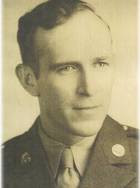

1910
James
2013
James Harshfield
February 23, 1910 — July 4, 2013
Born James Page Harshfield on 23 February 1910 in Fredonia, Kansas, he died July 4, 2013 at Bartlesville, Oklahoma, age 103. He was known to his friends as Page. Page Harshfield was the second child of Lovell Russaw Harshfield and Nellie Minnie Hane Harshfield. Page's father was a grocer, and Page grew up as children did in those days, helping in the family business. People came into the neighborhood store to pick up the day's groceries. As they checked out, young Page jotted down the prices: Can of salmon, 20�; quart of milk, 9�; 5 pounds corn meal, 18�… that was a time when cash registers were too expensive for small merchants. So, Page tallied up the tab in his head. Little did anyone suspect that this unusual gift would be a lifelong skill, employed throughout his professional life. Page's older brother was William Hane Harshfield. After Page, four more siblings were born: Roosevelt Winston, Monroe Clark, Margaret Vivian (Reynolds), and Armeda Jean (Dingman). Page's mother died when he was 16 years old, and soon after the young man left home for Independence, Kansas to matriculate one year at business college. A top student in 1929, he was grabbed up for his first job by Waite Phillip's Independent Oil & Gas Company in Tulsa. It was a culture shock to the young man from rural Kansas. Accustomed to tipping his hat to everyone on the streets of Fredonia, Tulsa seemed bustling and unfriendly. He shared a room at the YMCA while in Tulsa, but he did buy a Ford V-8 Sports Coupe. His office was in the Philtower. His job was clerical, doing secretarial and bookkeeping work in the Comptroller's Department. In 1930, Independent merged with Phillips Petroleum Company. Page moved to Bartlesville one month ahead of the merger, posting records of tank car sales. After the merger, job completed, Page was downsized just as the Depression job market hit free fall. But, C. J. Logue, his old boss, now chief accountant, moved him back into his old position. New to Bartlesville, a friend invited him to a young singles group at First Christian Church. It was there he met Dorothy Muder. He said he thought she was the cutest little thing he had ever seen. Page was transferred to Thrall, Kansas in 1932, for field experience. He lived in a bunkhouse that had been used by a pipeline rider. Now courting Dotty, he was taking the train back to Bartlesville every other week and staying at Eva Muder's house. 1 June 1933, Page married Dorothy Irene Muder at her mother's home in Bartlesville, Oklahoma. Dorothy was the Daughter of (the late) John William Muder and Eva Elizabeth (Warmbrodt) Muder. The young couple lived in a three-room company house in Thrall. Freshly painted, and held down from blowing away by "dead man anchors", the rent and utilities were $6.00 a month. When the dust storms roared through, the carpet stood off the floor. In 1935, Page was sent to Lyons, Kansas to set up the payroll for the new Phillips pipeline company. In Lyons they rented a nice house. Still, when the dust storms came, they would awake in the morning with little dust piles around their heads and on the pillowcases. The water well ran dry. Cities Service supplied natural gas to the house, but when pressure went down in the winter, they cut off gas to the houses. In 1936, T.E. Smalley asked Page to return to Bartlesville to work in the Comptroller's Department. Though Page was quite fast on the typewriter and adding machine, he could add in his head-accurately-faster than Smalley could add on the machine. Page was asked to do a running check of Smalley's machine tallies in his head. Dorothy and Page rented a garage apartment on 4th Street, belonging to Scotty Ambrose. It was such a brutally hot summer, that they frequently slept outside on the grass. Now settled in Bartlesville, Page became an active member of First Christian Church. He began by teaching Junior Boy's Sunday school. (Dorothy played the piano for the Junior Department.) Page was the representative from First Christian Church to the Sunday Evening Federation, and one year was chairman. The federation held Sunday evening church services held at Garfield School, sponsored by several churches in town. He served as church treasurer for fifteen years, and was a deacon for many years. Page was drafted 3 December and enlisted in the U.S. Army 10 December 1942. That Christmas he was in training at Plattsburg, New York. A year of training later, he shipped out with the First Army, 1111 Combat Engineer's Battalion aboard HMS Queen Mary. There were 15,000 troops aboard, bunked in former luxury staterooms now outfitted with wall bunks, stacked 3 high, 6 and 12 men to a room. They landed in Scotland and took the train from Edinburgh to a base near Oxford in England where he spent his second Christmas in Service. From there they moved to Stroud, Gloucestershire, to prepare for the D-Day invasion. A storm in the Channel prevented their embarkation in the first wave from South Hampton. He landed at Omaha Beach after it was secured. He was assigned to the Headquarters Company because he could type and take shorthand. He posted personal and payroll records, by this time a Staff Sergeant. His third Christmas in the Army was spent in the Battle of the Bulge. He had been promoted again, to Communications Sergeant, head of coding and decoding messages, and in charge of messengers. As his unit advanced toward Bastogne, Page said he hated to send messages with a kid in a jeep, so he often took a weapon himself and rode shotgun. Their mission was to blow up bridges, railroads, and otherwise impair German movement. They finally crossed the Rhine at Remagen Bridge ("A Bridge Too Far"), on pontoons. Pushing too far ahead of the artillery, they had to wait for them. After the war ended, Page was assigned to the Third Army, and then the Seventh Army at Munich. With hostilities ended, Page began classes at the American University in Biarritz. But when his outfit headed home, Page withdrew to join them on their return voyage on the USS Breckenridge. Landing in Boston, they took the troop train to Ft. Chaffee, Arkansas, then Fort Fanin, Texas where he was discharged 14 November 1945. From Texas, he took the Katy Railroad back to Bartlesville. During his service, Page was awarded the Bronze Star. Upon return, he resumed his former assignment at Phillips Petroleum Company, where he worked until his retirement 1 February 1975. His wife Dorothy preceded him in death 30 April 1996. In 1998, Page remarried to Vida M. (Murphy) (Shutt) Huddleston. Vida Harshfield preceded him in death on 26 June 2008. Page and Dorothy, and later, Vida were members of Hillcrest Country Club. In his retirement years he enjoyed playing golf, Sunday brunch with his friends, and his men's lunch group at Pizza Hut. Page is lovingly remembered by the children in the family. Dorothy and Page were always joyous and fun to little kids, warm and accepting to teenagers. Page is preceded in death by one niece, Shelly Reynolds Cotton, a nephew, Stephen Page Harshfield, and a stepson, Fred Schutt. He is survived by several nieces and nephews: Robert M. Kane, Louise Kane Roark, Ann Kane Seidman, Mark Kane, Terri Reynolds McKeon, Diane Dingman Rayburn, Kay Dingmen Bibens, Alex Dingman, David Dingman, Rachel Regalis, and their children. He is also survived by Vida's children, Viola Stanford and Beverly Swope, and his loving caregivers Lila Farrell, Jacque Dickson, and Violet Bryant, CHHAs.
Service Details
Tuesday, July 9th, 2013 10:00am, Memorial Park Cemetery Bartlesville
Interment Details
Memorial Park Cemetery Bartlesville
To order memorial trees or send flowers to the family in memory of James Harshfield, please visit our flower store.
Guestbook
Visits: 0
This site is protected by reCAPTCHA and the
Google Privacy Policy and Terms of Service apply.
Service map data © OpenStreetMap contributors



